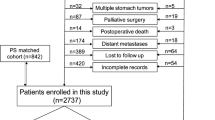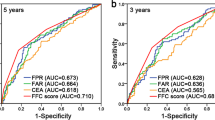Abstract
We aimed to determine the parameters that affect the mortality of patients operated on for gastric cancer and to investigate whether fibrinogen affects mortality or not. This retrospective clinical study included patients who underwent surgery due to gastric adenocarcinoma between January 2011 and January 2014. Patients’ demographic data, laboratory values, (hemogram parameters, fibrinogen, albumin, and tumor markers), operations, lymph node dissections, parameters of histopathology reports, stages, mortality/survival status, metastasis status at follow-up, and admission/operation/follow-up were obtained from the hospital automation system and recorded using the statistical software. Patients were divided into two groups: deceased and survivors. Analyses were carried out to determine whether the parameters of the patients, including fibrinogen, affected survival. A total of 130 patients were included in the study. Of the patients, 91 were men and 39 were women. The mean age of the patients was 63.99 SD 11.22 years. The results of the analysis of the patients’ parameters revealed that the presence of lymphatic invasion, lymph node positivity, high metastatic lymph node ratio, and advanced stage were statistically significantly correlated with low survival (p<0.05). A statistically significant correlation was found between the increase in patient age and high fibrinogen levels (p<0.05). High N stage, high grade, presence of lymphatic invasion, presence of metastasis at diagnosis, and high fibrinogen levels were found to be independent risk factors for gastric cancer mortality. It was concluded that patients with high fibrinogen levels had higher mortality rates in the early period of follow-up.

Similar content being viewed by others
References
Smyth EC, Nilsson M, Grabsch HI, van Grieken NCT, Lordick F (2020) Gastric cancer. Lancet 396:635–648. https://doi.org/10.1016/s0140-6736(20)31288-5
Bray F, Ferlay J, Soerjomataram I, Siegel RL, Torre LA, Jemal A (2018) Global cancer statistics 2018: GLOBOCAN estimates of incidence and mortality worldwide for 36 cancers in 185 countries. CA Cancer J Clin 68:394–424. https://doi.org/10.3322/caac.21492
Yamamoto M, Kurokawa Y, Kobayashi N, Takahashi T, Miyazaki Y, Tanaka K, Makino T, Yamasaki M, Nakajima K, Mori M, Doki Y (2020) Prognostic value of the combined index of plasma fibrinogen and the neutrophil-lymphocyte ratio in gastric cancer. World J Surg 44(1):207–212. https://doi.org/10.1007/s00268-019-05193-7
Yamamoto M, Kurokawa Y, Miyazaki Y, Makino T, Takahashi T, Yamasaki M, Nakajima K, Takiguchi S, Mori M, Doki Y (2016) Usefulness of preoperative plasma fibrinogen versus other prognostic markers for predicting gastric cancer recurrence. World J Surg 40:1904–1909. https://doi.org/10.1007/s00268-016-3474-5
Di Micco P, Romano M, Niglio A, Nozzolillo P, Federico A, Petronella P, Nunziata L, Di Micco B, Torella R (2001) Alteration of haemostasis in non-metastatic gastric cancer. Dig Liver Dis 33(7):546–550. https://doi.org/10.1016/s1590-8658(01)80105-5
Yamashita H, Kitayama J, Nagawa H (2005) Hyperfibrinogenemia is a useful predictor for lymphatic metastasis in human gastric cancer. Jpn J Clin Oncol 35(10):595–600. https://doi.org/10.1093/jjco/hyi150
Yamashita H, Kitayama J, Kanno N, Yatomi Y, Nagawa H (2006) Hyperfibrinogenemia is associated with lymphatic as well as hematogenous metastasis and worse clinical outcome in T2 gastric cancer. BMC Cancer 6:147. https://doi.org/10.1186/1471-2407-6-147
Dvorak HF (2015) Tumors: wounds that do not heal-redux. Cancer Immunol Res 3(1):1–11. https://doi.org/10.1158/2326-6066.CIR-14-0209
Zhang F, Wang Y, Sun P, Wang ZQ, Wang DS, Zang DS, Wang FH, Fu JH, Xu RH, Li YH (2017) Fibrinogen promotes malignant biological tumor behaviour involving epithelial-mesenchymal transition via a thep-AKT/p-mTOR pathway in esophageal squamous cell carcinoma. J Cancer Res Clin Oncol 143:2413–2424. https://doi.org/10.1007/s00432-017-2493-4
Suzuki T, Shimada H, Nanami T, Oshima Y, Yajima S, Ito M, Washizawa N, Kaneko H (2016) Hyperfibrinogenemia is associated with inflammatory mediators and poor prognosis in patients with gastric cancer. Surg Today 46(12):1394–1401. https://doi.org/10.1007/s00595-016-1339-z
Wakatsuki K, Matsumoto S, Migita K, Kunishige T, Nakade H, Miyao S, Sho M (2019) Prognostic value of the fibrinogen-to-platelet ratio as an inflammatory and coagulative index in patients with gastric cancer. Surg Today 49(4):334–342. https://doi.org/10.1007/s00595-018-1734-8
Zhang J, Li SQ, Liao ZH, Jiang YH, Chen QG, Huang B, Liu J, Xu YM, Lin J, Ying HQ, Wang XZ (2017) Prognostic value of a novel FPR biomarker in patients with surgical stage II and III gastric cancer. Oncotarget 8(43):75195–75205. https://doi.org/10.18632/oncotarget.20661
Quéro L, Guillerm S, Hennequin C (2015) Neoadjuvant or adjuvant therapy for gastric cancer. World J Gastrointest Oncol 7(8):102–110. https://doi.org/10.4251/wjgo.v7.i8.102
Orman S, Cayci HM (2019) Gastric cancer: factors affecting survival. Acta Chir Belg 119(1):24–30. https://doi.org/10.1080/00015458.2018.1453437
Kelley JR, Duggan JM (2003) Gastric cancer epidemiology and risk factors. J Clin Epidemiol 56(1):1–9. https://doi.org/10.1016/s0895-4356(02)00534-6
Yamashita K, Hosoda K, Ema A, Watanabe M (2016) Lymph node ratio as a novel and simple prognostic factor in advanced gastric cancer. Eur J Surg Oncol 42:1253–1260. https://doi.org/10.1016/j.ejso.2016.03.001
Repetto O, De Re V (2017) Coagulation and fibrinolysis in gastric cancer. Ann N Y Acad Sci 1404(1):27–48. https://doi.org/10.1111/nyas.13454
Lip GY, Chin BS, Blann AD (2002) Cancer and the prothrombotic state. Lancet Oncol 3(1):27–34. https://doi.org/10.1016/s1470-2045(01)00619-2
Goldenberg N, Kahn SR, Solymoss S (2003) Markers of coagulation and angiogenesis in cancer-associated venous thromboembolism. J Clin Oncol 21(22):4194–4199. https://doi.org/10.1200/jco.2003.05.165
Palumbo JS, Talmage KE, Massari JV, La Jeunesse CM, Flick MJ, Kombrinck KW, Jirousková M, Degen JL (2005) Platelets and fibrin(ogen) increase metastatic potential by impeding natural killer cell-mediated elimination of tumor cells. Blood 105(1):178–185. https://doi.org/10.1182/blood-2004-06-2272
Palumbo JS, Kombrinck KW, Drew AF, Grimes TS, Kiser JH, Degen JL, Bugge TH (2000) Fibrinogen is an important determinant of the metastatic potential of circulating tumor cells. Blood 96(10):3302–3309
Simpson-Haidaris PJ, Rybarczyk B (2001) Tumors and fibrinogen. The role of fibrinogen as an extracellular matrix protein. Ann N Y Acad Sci 936:406–425. https://doi.org/10.1111/j.1749-6632.2001.tb03525.x
Dvorak HF, Brown LF, Detmar M, Dvorak AM (1995) Vascular permeability factor/vascular endothelial growth factor, microvascular hyperpermeability, and angiogenesis. Am J Pathol 146:1029–1039
Dvorak HF (2002) Vascular permeability factor/vascular endothelial growth factor: a critical cytokine in tumor angiogenesis and a potential target for diagnosis and therapy. J Clin Oncol 20:4368–4380. https://doi.org/10.1200/jco.2002.10.088
Palaj J, Kečkéš Š, Marek V, Dyttert D, Waczulíková I, Durdík Š (2018) Fibrinogen levels are associated with lymph node involvement and overall survival in gastric cancer patients. Anticancer Res 38(2):1097–1104. https://doi.org/10.21873/anticanres.12328
Cheng F, Zeng C, Zeng L, Chen Y (2019) Clinicopathological and prognostic value of preoperative plasma fibrinogen in gastric cancer patients: a meta-analysis. Medicine (Baltimore) 98(40):e17310. https://doi.org/10.1097/MD.0000000000017310
Podgrabinska S, Braun P, Velasco P, Kloos B, Pepper MS, Skobe M (2002) Molecular characterization of lymphatic endothelial cells. Proc Natl Acad Sci U S A 99:16069–16074. https://doi.org/10.1073/pnas.242401399
Yu W, Wang Y, Shen B (2016) An elevated preoperative plasma fibrinogen level is associated with poor overall survival in Chinese gastric cancer patients. Cancer Epidemiol 42:39–45. https://doi.org/10.1016/j.canep.2016.03.004
Funding
This study received no specific grant from any funding agency in the public, commercial, or not-for-profit sectors.
Author information
Authors and Affiliations
Contributions
Tolga Dinç: study design, acquisition, analysis, and interpretation of data; Hikmet Özel: acquisition, drafting the manuscript; Özgür Akgül: acquisition, analysis, and interpretation of data; Erdinç Çetinkaya: study design and acquisition. All authors have participated to drafting the manuscript and read and approved the final version of the manuscript.
Corresponding author
Ethics declarations
Patients’ Consent
Due to the retrospective design of the study, the patient consent was waived.
Conflict of Interest
The authors declare no competing interests.
Additional information
Additional Information to the Editor
Language and grammar editing was performed by English Proofreading, Scientific Paper Editing & Proofreading Service.
Publisher’s Note
Springer Nature remains neutral with regard to jurisdictional claims in published maps and institutional affiliations.
Rights and permissions
About this article
Cite this article
Dinç, T., Pehlevan Özel, H., Akgül, Ö. et al. Is Fibrinogen an Effective Marker for Predicting Mortality in Patients with Gastric Cancer?. Indian J Surg 83 (Suppl 3), 761–767 (2021). https://doi.org/10.1007/s12262-021-02915-x
Received:
Accepted:
Published:
Issue Date:
DOI: https://doi.org/10.1007/s12262-021-02915-x




